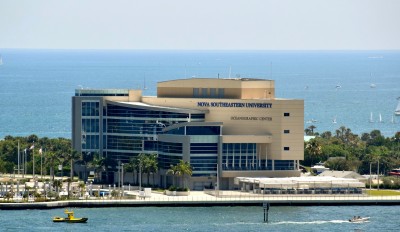NSU Newsroom
SharkBytes
Horizons
This version of NSU News has been archived as of February 28, 2019. To search through archived articles, visit nova.edu/search. To access the new version of NSU News, visit news.nova.edu.
This version of SharkBytes has been archived as of February 28, 2019. To search through archived articles, visit nova.edu/search. To access the new version of SharkBytes, visit sharkbytes.nova.edu.
Nova Southeastern University Professor & Leading Marine Life Expert to Appear in PBS’s Changing Seas Series
FORT LAUDERDALE-DAVIE, Fla. – Nova Southeastern University is very proud to announce that one of its own – Charles Messing, Ph.D. from NSU’s Oceanographic Center – will be part of the Emmy award-winning original series on PBS, Changing Seas. 
Messing, who studies systematics, evolution and ecology of living Crinoidea (Echinodermata) and tropical deep-water hard-substrate assemblages, will be part of the first of four new episodes. His episode, Living Fossils, airs 8 p.m. Wednesday, June 18th on PBS. This episode features the deep, dark waters off the coast of Roatan, Honduras, where strange flowerlike animals flourish. These sea lilies and feather stars, known as Crinoids, have been around in various forms since before the age of dinosaurs. Messing joins other experts as they descend into the deep to study the animals from a submersible.
What makes this even cooler is that the new episodes will be simulcast online at www.changingseastv.tv where viewers will be able to engage in conversations with a panel of experts via a chat room. Messing, will be participating in this online chat, so be sure to log on Wednesday, June 18th!
In addition, NSU’s Oceanographic Center will be hosting the free “Dive In Summer Film Series” to view the Changing Seas episodes and meet the experts in person. These screenings are free, but space is limited. Anyone interested in attending MUST register in advance at Lcorinne@nova.edu or by calling 954-262-3678.
The schedule for the Dive in Summer Film Series is:
July 9th
Galápagos: Windows into the Future, a co-production with the Khaled bin Sultan Living Oceans Foundation
Speakers: Phil Renaud, Executive Director, Khaled bin Sultan Living Oceans Foundation; Andy Bruckner, Ph.D., chief scientist, Khaled bin Sultan Living Oceans Foundation; Peter Glynn, Ph.D., professor, University of Miami RSMAS (tentative); Derek Manzello, Ph.D., research oceanographer, NOAA’s Atlantic Oceanographic & Meteorological Laboratory (tentative)
July 23rd
Biggest Fish in the Sea
Speaker: Al Dove, Ph.D., Director, Research & Conservation, Georgia Aquarium
August 6th
Living Fossils
Speaker: Charles Messing, Ph.D., Professor, Nova Southeastern University
August 21th
Saving Sawfish
Speakers: John Carlson, Ph.D., Research Fish Biologist, NOAA National Marine Fisheries Service; Dana Bethea, Research Ecologist, NOAA National Marine Fisheries Service; Gregg Poulakis, Ph.D., Research Associate, FWC Fish and Wildlife Research Institute
###
About Nova Southeastern University: Situated on 314 beautiful acres in Fort Lauderdale, Florida, Nova Southeastern University (NSU) is a dynamic research institution dedicated to providing high-quality educational programs at all levels. NSU is a not-for-profit independent institution with an enrollment of 27,000 students. NSU awards associate’s, bachelor’s, master’s, specialist, doctoral and first-professional degrees in a wide range of fields. NSU is classified as a research university with “high research activity” by the Carnegie Foundation for the Advancement of Teaching, and it is one of only 37 universities nationwide to also be awarded Carnegie’s Community Engagement Classification. For more information, please visit www.nova.edu. Celebrating 50 years of academic excellence!
About NSU’s Oceanographic Center: The Oceanographic Center provides high-quality graduate education programs (i.e. master’s, doctoral, certificate) in a broad range of marine science disciplines. Center researchers carry out innovative, basic and applied marine and research programs in coral reel biology, ecology, and geology; fish biology, ecology, and conservation; shark and billfish ecology; fisheries science; deep sea organismal biology and ecology; invertebrate and vertebrate genomics, genetics, molecular ecology, and evolution; microbiology; biodiversity; observation and modeling of large scale ocean circulation, coastal dynamics, and ocean atmosphere coupling; benthic habitat mapping; biodiversity; histology; and calcification. For more information, please visit http://www.nova.edu/ocean